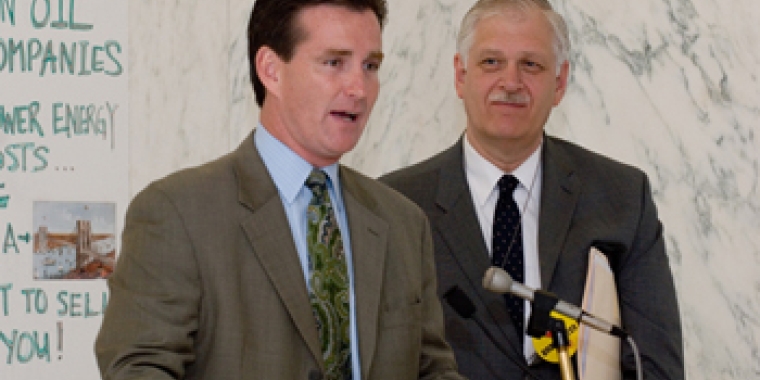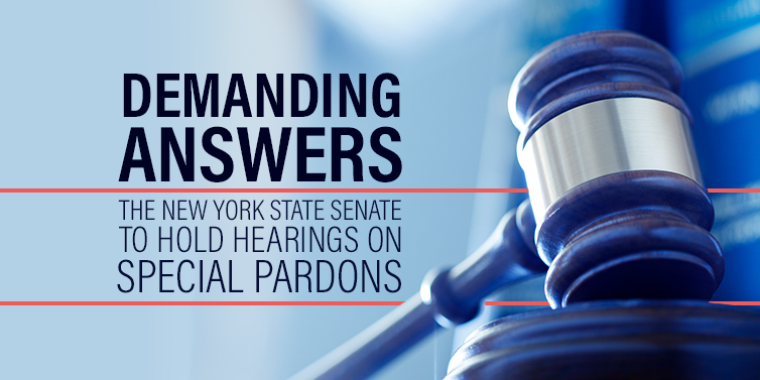
Senator Flanagan Joins With Long Island Advocates To Oppose Broadwater

Senator John Flanagan 2nd Senate District) recently joined with a large group of advocates who traveled to Albany to urge Governor Eliot Spitzer to voice their opposition to the Broadwater Energy project proposed for the Long Island Sound. The group joined with a number of members of both the Senate and the Assembly to voice their opposition to this project.
"The waters of the Long Island Sound are the very lifeblood of our community and they need to be protected. This is a project that will offer our residents very little benefit but that will pose unecessary dangers and inconveniences and it must be rejected," stated Senator Flanagan. "I urge Governor Spitzer to join with us to protect the Long Island Sound and to oppose Broadwater."
The organizations that traveled to Albany to join with Senator Flanagan included NYPIRG, Sierra Club, Citizens Campaign for the Environment Executive, Connecticut Fund for the Environment, Save the Sound, Long Island Environmental Voters Forum, members of the Anti-Broadwater Coalition and the public.
Broadwater, a joint venture between Shell Oil and TransCanada, is seeking to build a gigantic Liquefied Natural Gas (LNG) barge in the Long Island Sound. This barge would be 1200 feet long, 180 feet wide and it would store 8 billion cubic feet of natural gas in the middle of the Long Island Sound. This floating facility would be the first of its kind anywhere in the world.
"Diverse community members and environmental leaders are all unified in opposition to Broadwater. The people want to be heard by the people’s Governor. We are asking the Governor to help us protect our treasured waterway, to find an alternative to Broadwater," said Citizens Campaign for the Environment Executive Director Adrienne Esposito. "We cannot allow Shell Oil to steamroll their way to take over our Long Island Sound"
"Almost everybody is against Broadwater. It's high time Governor Spitzer showed some leadership and ended the Broadwater threat," said Dick Amper, Executive Director of the Long Island Pine Barrens Society.
"In order to fully understand the economic impact of Broadwater, New Yorkers need to account for the hidden cost to local and state governments for security," stated Jason K. Babbie, Senior Environmental Policy Analyst for the New York Public Interest Research Group. "Even if there is a positive economic impact from increased natural gas supply, it does not mean a LNG storage facility in Long Island Sound is the best place, which is why an alternatives analysis is critical for adequate review."
"The Sierra Club is strongly opposed to the Broadwater Energy Project as a major threat to the ecology of Long Island Sound. The State needs to emphasize energy conservation and renewable energy initiatives in planning for energy needs and at the same time protecting our environment," said Sierra Club Conservation Chair Susan Lawrence.
Prior to this rally, Senator Flanagan joined with his Senate majority colleagues in expressing their opposition to this facility. In a May 22 letter sent to Governor Spitzer, the eight Senate Republicans from Long Island called for the Department of State to deny the approval of this project. Senator Flanagan and his colleagues cited the risk of terrorism, the risk this facility poses to Long Island residents and the disruption of the daily activities seen on the Long Island Sound.
In the letter, the legislators state: "We have the opportunity to clearly articulate the expectations we have as stewards of Long Island Sound. We must insist upon strict compliance with our Coastal Management Policies. We must choose the safety of our citizens over an unproven and speculative short term commercial objective. Please join us in saying ‘NO’ to this proposal."
May 22, 2007
Honorable Eliot L. Spitzer
Governor
New York State
Executive Chamber
Albany, New York 12224
Dear Governor Spitzer:
As Senators who represent Long Island, we urge you to join us and the majority of Long Island residents in opposing the placement of the Broadwater Liquefied Natural Gas (LNG) facility in Long Island Sound. At this sentinel period in the history of the Sound, adherence to New York’s Coastal Management policies is vital for the Sound’s protection and continued viability.
The Department of State is required to review Broadwater’s proposed activities and consistency certification to determine if the proposed activity is consistent with the approved Coastal Management Programs including the Long Island Sound Coastal Management Program. If the proposed activity is not consistent with these approved Coastal Management Programs, the Department of State must make a negative finding. The Broadwater application violates numerous aspects of the Long Island Sound Coastal Management Program in that it will not only adversely affect the environmental quality of Long Island Sound, but it will also disrupt the commercial and recreational activities attendant to this body of water.
The United States Department of the Interior has raised concerns that the five (5) million gallons of cooling water used daily by the terminal and the tankers could kill millions of fish eggs and larvae, and possibly affect endangered birds. There is also concern that the mooring platform, which holds the facility and covers approximately 7,000 square feet of sea floor, could disturb a multitude of organic and inorganic materials. In addition the possibility that millions of gallons of LNG being dumped into Long Island Sound if there were an accident or act of terrorism would cause significant damage to the ecosystem. Clearly, this would violate the Long Island Sound Coastal Management Program’s expressed policy of preserving the physical and biological integrity of the sound.
The Broadwater project would also disrupt the daily commercial and recreational activities that occur in Long Island Sound. In order to get tankers to the facility there would have to be "no entry zones" around moving tankers. These "no entry zones" would have to be approximately two (2) miles ahead of the tankers, one (1) mile behind them, and four-tenths of a mile on each side of them. These operations would restrict the movement of other vessels such as ferry companies and fishermen who routinely use the waters of Long Island Sound. Such restrictions would be in direct conflict with the Long Island Sound Coastal Management Program’s mandate that all proposed activity ensure that the social and economic benefits to the use of the Sound be maximized to the fullest extent possible. If approved, this project would render the Coastal Zone Management Act meaningless and open the door to the industrialization of Long Island Sound, which is specifically what the Coastal Zone Management Act was designed to prevent.
Approval of the Broadwater project would also create a terrorist target in Long Island Sound. This highly visible and easily identifiable structure is in close proximity to other targets which include the Millstone Nuclear Power Plant, Seawolf Nuclear Submarine Base and Plum Island. The potential exists for terrorists to drive a vessel into the Broadwater station, place explosives in the path of LNG tankers delivering LNG to the regasification station, or take control of one of these tankers and sail it towards a major populated area where the cargo could then be detonated. If an explosion were to occur and the LNG were to be ignited, it would burn at over 3,000 degrees and could burn human skin in a radius of one (1) mile. Even if the LNG does not immediately ignite, but simply spills into the water of Long Island Sound, it could form a vapor cloud which could drift some distance from the spill until it encounters an ignition source. If this were to happen, little could be done to protect Long Island residents as LNG not only burns more intensely than gasoline or oil fires, but it also cannot be extinguished until all of the LNG has been consumed. Given the fact that there have been at least fifteen (15) LNG spills since 1965, and six (6) proposed terminals have been abandoned in North America, this poses an unacceptable safety risk to Long Island residents.
There are also no reliable ways to protect the Broadwater facility from an attack. The Coast Guard has testified that they do not have the resources to provide the security required. This means that private security companies may have to be used in place of the Coast Guard. Even if the Coast Guard could provide security, the cost of accompanying these LNG tankers would be exorbitant. The Congressional Research Services estimates that it would cost $40,000 per trip, $24 million per year for the Coast Guard to accompany tankers delivering LNG to the Broadwater station. This expense would increase to $120 million by 2030; all at taxpayer cost.
The possibility of a terrorist attack on Broadwater is even more likely given the fact that securing LNG tankers is a relatively new phenomena. To date, there is not a single American flag LNG vessel. This means that foreign flag ships will have to be used and these ships are not subject to the same Coast Guard training or security measures as American vessels. These ships routinely come within one (1) mile of the shore of Long Island as they navigate their way up the sound; the exact distance which places residents at risk of exposure to an LNG fire or explosion.
Aside from the safety and environmental hazards that this project poses, there are also serious doubts that the natural gas will be used on Long Island. It will be transshipped to points west with little being available to the residents of Long Island. The Long Island Sound LNG Task Force has pointed out that three (3) new liquefied natural gas terminals in Massachusetts and Eastern Canada will bring a new supply of LNG to Connecticut and New York. These supplies could be available sooner than Broadwater and pose less of an environmental risk than locating a terminal in Long Island Sound.
We have the opportunity to clearly articulate the expectations we have as stewards of Long Island Sound. We must insist upon strict compliance with our Coastal Management Policies. We must choose the safety of our citizens over an unproven and speculative short term commercial objective. Please join us in saying "NO" to this proposal.
Sincerely yours,
Kenneth P. LaValle, 1st District
John J. Flanagan, 2nd District
Caesar Trunzo, 3rd District
Owen H. Johnson, 4th District
Carl L. Marcellino, 5th District
Kemp Hannon, 6th District
Charles J. Fuschillo, Jr., 8th District
Dean G. Skelos, 9th District
TO SEND AN E-MAIL TO SENATOR FLANAGAN, PLEASE CLICK HERE.
IF YOU WOULD LIKE TO RECEIVE REGULAR UPDATES FROM SENATOR FLANAGAN, PLEASE CLICK HERE.



